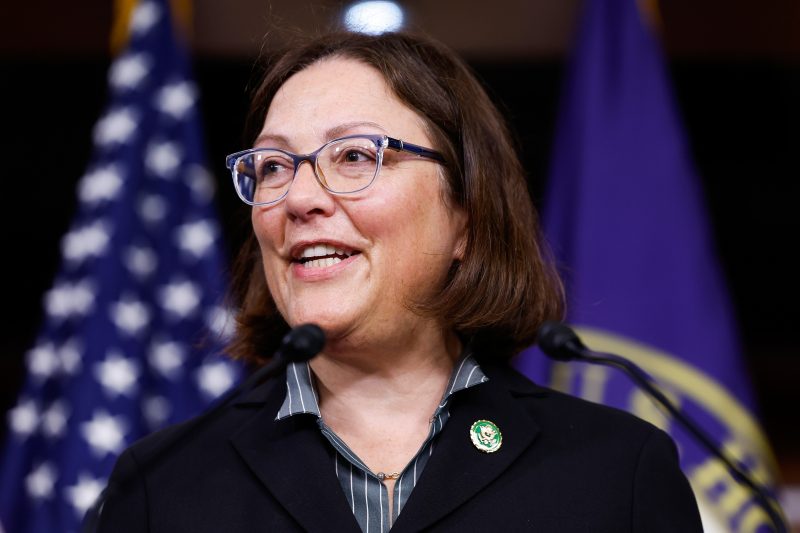Syria’s interim president calls communal clashes that left hundreds dead ‘expected challenges’
Aiming to retake House, DCCC invests $35 million to mobilize voters of color


The Democratic Congressional Campaign Committee will invest millions of dollars in an initiative that aims to engage with and persuade voters of color to support Democratic candidates as part of its effort to take back the House majority in November.
The initial $35 million push, which the committee announced Tuesday, will target key congressional districts with large minority populations and comes amid growing concerns about minority voters in 2024.
The DCCC’s initiative — P.O.W.E.R. (“Persuade. Organize. Welcome. Educate. Reach.”) the People — surpasses the committee’s $30 million investment during the 2022 election cycle. The initiative will focus on research and polling, paid media, organizing, voter protection and education, as well as countering disinformation.
“Democrats are committed to bringing responsible governance back to the House so that we can continue the important work of lowering costs, protecting and expanding health care, and delivering for our constituents,” Rep. Suzan DelBene (D-Wash.), the DCCC chair, said in a statement. “We know that voters of color are critical to Democrats’ coalition and the DCCC’s investments highlight our commitment to continuously engaging with communities of color on issues they care about.”
Despite President Biden’s low approval rating, Democrats faired better than anticipated in 2022, staving off a predicted “red wave,” and had a banner off-year election in 2023. But so far, key minority demographics historically aligned with Democrats’ voting coalition are showing less enthusiasm for supporting the party in 2024 — with recent surveys suggesting minority voters have been less interested in the upcoming races than their White counterparts.
A national Fox News poll in December found White registered voters were 13 percentage points more likely than Black voters to be “extremely interested” in the 2024 presidential election, 59 percent vs. 46 percent. Among Hispanic voters, 55 percent were extremely interested.
Tim Persico, a former executive director of the DCCC, said one of the major lessons after recent election cycles was that the party needed to engage early with prospective minority voters.
“What we learned from our predecessors was (that) we have to start this commitment to communities of color early. It needs to be an investment, not just in TV and not just in digital or mail, but all of the above, plus on-the-ground organizing,” said Persico, who is now a principal at GPS Impact, a communications consulting firm.
The committee said in a news release on Tuesday they plan to use polling and research to tailor their messaging in different congressional districts to be “culturally competent,” also delivering the messaging in several languages. It also said it is undertaking the DCCC’s first “media consumption research project to ensure that we are smartly reaching people where and when they consume information.”
The DCCC also will make efforts to educate voters of color about changes to voting laws and informing them about ballot options. As part of its efforts to counter disinformation, the committee is launching an information hub that “will provide engaging content and resources that can be easily shared with friends, family, and community members to push back against false narratives and tout key accomplishments from House Democrats.”
The DCCC has identified at least seven key districts to focus on with its initiative: The 22nd and 45th districts in California, Florida’s 27th, New Mexico’s 2nd, the 15th and 34th in Texas, and North Carolina’s 1st.
The committee intends to defend Democratic incumbents in some of those districts, while the DCCC hopes to flip others that are represented by Republicans. Five of the districts are majority Latino.
Chuck Rocha, the founder of Solidarity Strategies, said that in the coming election, “minority voters, especially Latinos, will be the deciding factor, more so than they ever have in the history of our nation, in who controls Congress and the Senate.”
Cliff Albright, co-founder of the Black Voters Matter Fund, said that while polls suggesting a lack of engagement among voters of color this election cycle are concerning to Democrats, “the closer we get to the election, the more these opinion polls are going to change, the more it becomes clear to people that, look, this is not a referendum. This is a choice.”
Albright, however, remains concerned about whether the Israel-Gaza war could push away minority voters — particularly Black voters — in November. A Quinnipiac University poll released in November showed that 40 percent of Black voters and 50 percent of Hispanic voters disapprove of Biden’s handling of the conflict.
“I think what’s going on with Gaza now is creating real and possibly lasting rifts within the coalition,” Albright said, later adding, “Wars have cost presidencies.”
“Black enthusiasm is going to change between now and next November, but I would not take for granted either the way that you communicate with Black folks, the frequency that you communicate with Black voters and then the stance on some issues, like this Gaza issue,” he added.











